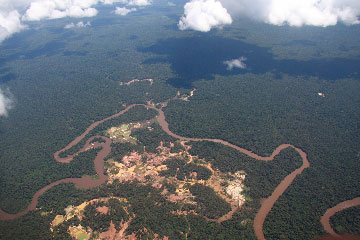Brazil may allow mining on indigenous lands in the Amazon
Brazil may allow mining on indigenous lands in the Amazon
mongabay.com
August 21, 2008
|
|
Lawmakers in Brazil are debating whether to allow mining companies to partner with indigenous groups to exploit mineral deposits deep in the Amazon rainforest, reports Bloomberg.
While mining in the Brazilian Amazon has often been associated with pollution, overhunting, deforestation, road-building, the spread of disease and violence against indigenous groups, it has great wealth to some tribes, notably the Kayapo in the Xingu River basin. The Kayapo have used the proceeds from a mining tax levied on developers to fund opposition to other forest-destroying activities.
With prices for precious metals and minerals near all-time highs there is substantial pressure on indigenous groups to cash in on the potential riches beneath their feet, while avoiding past problems, many of which were associated with illegal wildcat miners known in Brazil as garimpeiros. Still some indigenous rights groups are opposed to measures that would open up their territories to more development.
“Indian lands have special characteristics,” Paye Pereira, a Tiriyo Indian who has been lobbying on behalf of her 1,100-member tribe against the proposed law that would allow prospecting on indigenous lands, told Bloomberg. “The preservation of natural resources, which allow hunting, fishing and the gathering of fruit, forms a basic part of the survival of tribes.”
Pereira believes the law would lead to further exploitation of indigenous territories and threaten traditional ways of life.
 Gold mining in Suriname. Brazilian gold miners commonly cross borders to work in Suriname, Guyana, French Guiana, and Venezuela. |
“About 4 percent of Indian lands have been deforested, up from zero in 2003, and this could grow considerably,” Adalberto Verissimo, senior researcher at the Amazonia Institute for Man and the Environment (INPA) in Belem, in the state of Para, told Bloomberg. “The cultural threat to the Indians of mining activity is far greater than the environmental threat.”
The mining industry disagrees, arguing that legalizing mining would reduce illegal incursions and bring operations under stricter environmental regulation. Miners say expanded production would help meet surging global demand for minerals.
“Opening up these lands would be great for the industry,” Ailton Carlos Drummond de Oliveira, a board adviser to Mineracao Caraiba SA, A Brazilian mining firm which is developing a gold mine in Mato Grosso, was quoted as saying by Bloomberg. “Almost half of Mato Grosso and Para states, which are full of minerals, today are blocked off” as indigenous reserves.
Bloomberg reports that President Luiz Inacio Lula da Silva supports industry on the measure, which still needs to win a series of approvals from Congress and Senate before it could become law.
The proposed law would give Indians 4 percent royalties and allow them to negotiate for a bigger share of profits. Indigenous groups could refuse to allow mining or they could organize small-scale projects on 100-hectare (247-acre) plots, according to the bill’s sponsor, Federal Deputy Eduardo Valverde.
Related
High mineral prices drive rainforest destruction
(8/13/2008) The surging price of minerals is contributing to degradation and destruction of rainforests worldwide, warns a researcher writing in the current issue of New Scientist.